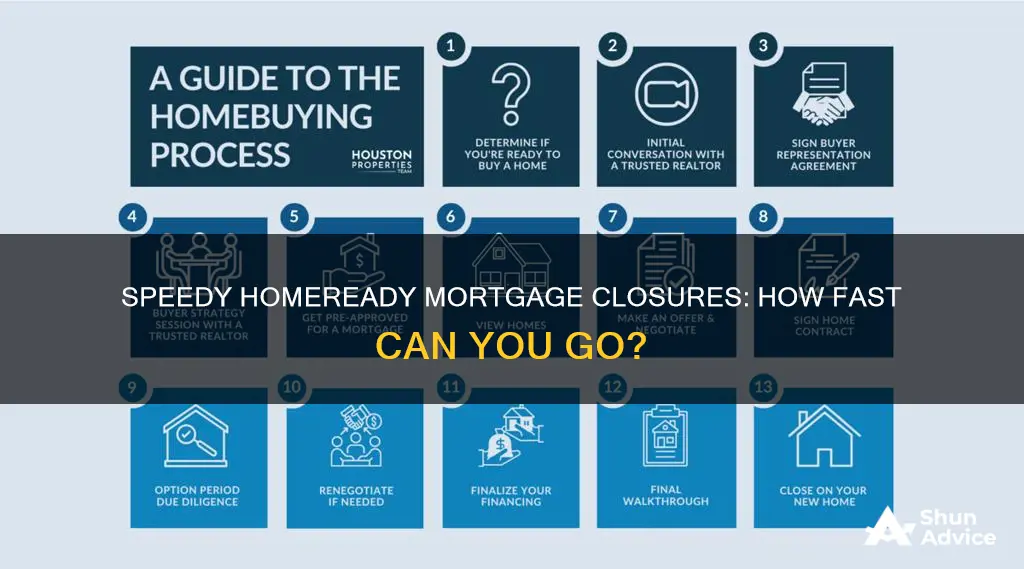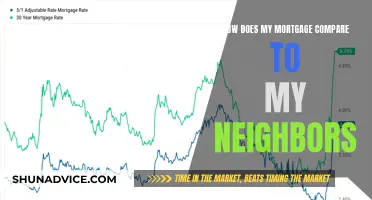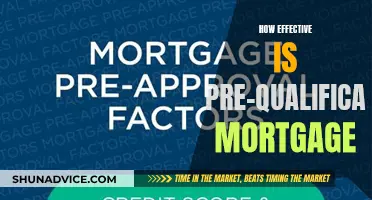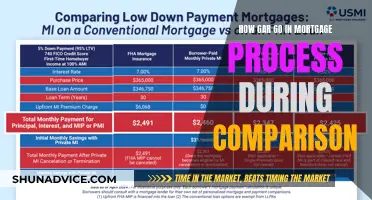
The HomeReady Mortgage program is a loan program that helps low-income borrowers get on the property ladder. It is sponsored by government-sponsored enterprise Fannie Mae and funded by mortgage lenders. The program offers flexible down payment requirements and an inclusive definition of income, allowing borrowers to use funds from various sources to cover the 3% minimum down payment and closing costs. This includes gifts, grants, and second mortgages. HomeReady mortgages also offer lower mortgage insurance requirements, and borrowers can cancel their mortgage insurance once they have paid down 20% of their home's value. The program is open to first-time and repeat homebuyers, as well as those seeking to refinance an existing mortgage.
| Characteristics | Values |
|---|---|
| Down payment | 3% minimum |
| Mortgage insurance | Reduced requirements, can be cancelled once 20% of the home's value is paid |
| Credit score | 620 or greater, with better pricing for scores of 680 or more |
| Income eligibility | 80% or less of the area median income (AMI) for the census tract in which the property is located |
| Maximum loan amount | $350,000 (Rocket Mortgage), $766,550 for a single-unit property in the contiguous US (FHFA conforming loan limit), $1,149,825 for properties in Hawaii, Alaska, Guam, or the US Virgin Islands |
| Credit | $2,500 for eligible first-time homebuyers with incomes at 50% or less of their area median income |
| Loan term | 10, 15, 20, or 30-year fixed-rate, or 5, 7, or 10-year adjustable-rate |
| Property type | Primary residence, up to four units |
What You'll Learn

HomeReady Mortgage: Who is eligible?
HomeReady Mortgage is a loan program offered by Fannie Mae to help creditworthy but low-income borrowers qualify for a mortgage. It is designed to reduce the barriers to homeownership for low-income and very low-income borrowers. The program offers a range of benefits, including low down payments, low financing costs, and low mortgage insurance costs.
The HomeReady Mortgage program is open to first-time and repeat homebuyers, as well as those seeking to refinance an existing mortgage. To be eligible, borrowers must have a credit score of 620 or higher, with scores of 680 or more resulting in better pricing options. Borrowers are also required to have an income that is 80% or less of the area median income (AMI) for the census tract in which the property is located. This condition includes properties in low-income census tracts.
The HomeReady Mortgage program offers flexible funding options, allowing borrowers to use a variety of sources towards a down payment or closing costs. There is no minimum personal contribution required, and borrowers can accept gifts, grants, and Community Seconds mortgages to fund their down payment. Additionally, borrowers can use the potential rental income from a home with an attached rental unit to boost their qualification for the mortgage.
The program also offers lower-than-standard mortgage insurance coverage requirements when the loan-to-value (LTV) ratio is between 90% and 97%cancel their monthly mortgage insurance payments when the LTV ratio drops below 80%. It is important to note that HomeReady mortgages have limits on the amount that can be borrowed, and income limits may apply for all borrowers.
The Best Time to Apply for a Mortgage
You may want to see also

How to apply for a HomeReady Mortgage
A HomeReady Mortgage is a loan program that helps home buyers save on the cost of buying a house. It is offered by Fannie Mae and is designed for low- and moderate-income borrowers who can afford the minimum down payment. The program offers adjustable underwriting guidelines with some flexibility around loan terms depending on the borrower's situation.
Step 1: Understand the Benefits and Requirements
Before applying, it is important to understand the benefits and requirements of a HomeReady Mortgage. This mortgage program offers flexible funding options, allowing borrowers to use a variety of sources for the down payment and closing costs. The down payment requirement is typically lower than other types of loans, ranging from 3% to 5% of the home's value. Additionally, HomeReady Mortgages offer reduced mortgage insurance requirements, making it easier for low-income buyers to get approved.
Step 2: Check Income and Credit Score Eligibility
To qualify for a HomeReady Mortgage, borrowers must meet certain income limits and credit score requirements. The program considers nontraditional credit, such as rent, utilities, medical insurance, car insurance, and even payments to local stores. It is important to review these requirements before proceeding with the application process.
Step 3: Shop for a Mortgage and Compare Lenders
Most lenders offer HomeReady loans, so it is advisable to shop around and get quotes from multiple lenders to compare rates and fees. Consider factors such as the quality of their services, average interest rates, and customer reviews.
Step 4: Complete a Homeownership Education Course
As part of the HomeReady Mortgage requirements, borrowers must complete a homeownership education course. This course can be taken online or in person and is designed to prepare future homeowners for the responsibilities of owning a home.
Step 5: Gather Required Documents
When applying for a HomeReady Mortgage, borrowers will need to provide various documents, including those related to income, debts, assets, employment, and property. Lenders will evaluate these documents to assess the borrower's financial situation and ability to repay the loan.
Step 6: Find a Lender and Apply
Once you have completed the previous steps and gathered the necessary documentation, you are ready to find an outside lender and submit your application. HomeReady loans are offered through private lenders, but it is important to note that you cannot apply directly with Fannie Mae.
It is important to carefully review the terms and conditions of the loan and seek professional advice if needed before proceeding with the application process.
Unlocking Your Mortgage: Borrowing More, Simplified
You may want to see also

Benefits of a HomeReady Mortgage
A HomeReady Mortgage is a great option for creditworthy low-income borrowers, offering a range of benefits to help more people achieve homeownership. Here are some of the key advantages:
Low Down Payment
One of the most significant benefits of a HomeReady Mortgage is the low down payment requirement. Borrowers only need to pay a minimum of 3% of the home's purchase price as a down payment. This is significantly lower than the standard 20% down payment typically required for other conventional loans. This low down payment option makes homeownership more accessible to those who may have been unable to afford the larger down payment typically required.
Flexible Down Payment Sources
HomeReady Mortgages also offer flexibility when it comes to the source of the down payment. Borrowers are not restricted to using their personal savings or funds. They can accept gifts from family and friends, assistance grants, or even "sweat equity" through partnerships with non-profit housing providers. This flexibility ensures that borrowers can access a variety of funding sources to meet the down payment requirement.
Reduced Mortgage Insurance Requirements
HomeReady Mortgages also come with reduced mortgage insurance requirements. When the loan-to-value (LTV) ratio is between 90% and 97%, borrowers benefit from lower-than-standard mortgage insurance coverage requirements. Additionally, borrowers have the ability to cancel their monthly mortgage insurance payments once the LTV ratio drops below 80%. This feature provides borrowers with greater financial flexibility and peace of mind.
Flexible Income Sources
The HomeReady Mortgage program understands that not all borrowers have traditional income sources. It allows for flexible income sources, including rental income, to be included in the loan application. This feature ensures that individuals with non-traditional income streams can still qualify for a mortgage and achieve homeownership.
Co-Borrowers Allowed
Another advantage of the HomeReady Mortgage is the option to include co-borrowers on the loan. Parents and other family members can be co-borrowers, even if they do not plan on living in the home. This feature can provide additional financial support and make it easier for borrowers to qualify for the loan.
Overall, the HomeReady Mortgage program offers a range of benefits designed to increase access to homeownership for low-income borrowers. With its low down payment, flexible income and down payment sources, reduced mortgage insurance requirements, and co-borrower options, the HomeReady Mortgage provides a more inclusive path to achieving the dream of owning a home.
Usaa's Response to Poor Mortgage Reviews: What to Know
You may want to see also

Drawbacks of a HomeReady Mortgage
The HomeReady Mortgage Program by Fannie Mae is designed to be a path to homeownership for low-income borrowers. It offers a range of benefits, including a low down payment of 3%, flexible funding options, and the ability to use alternative income sources to qualify for the mortgage. However, there are a few drawbacks to consider:
Higher Interest Rates: One of the main drawbacks of a HomeReady Mortgage is the potential for higher interest rates. While the program offers competitive interest rates, they may still be higher than those available through other mortgage options. This could result in borrowers paying more in interest over the life of the loan.
Income and Loan Limits: The HomeReady Mortgage Program has income limits for borrowers, which can be restrictive for some applicants. The income limit is typically set at 80% or less of the area median income (AMI) for the census tract in which the property is located. This means that borrowers with higher incomes may not be eligible for the program. Additionally, there may be limits on the loan amount, which could impact the type of property one can purchase.
Limited Property Types: While HomeReady mortgages can be used for a variety of home types, including single-family homes, townhouses, and condos, there are still some restrictions. For example, borrowers are not allowed to own any additional residences in the country when applying for this program. This means that those looking to invest in multiple properties or own a second home may not find this program suitable.
Strict Requirements: To qualify for a HomeReady Mortgage, borrowers must meet specific criteria, including a minimum credit score of 620 and completion of homeownership education courses. These requirements can be more stringent than those of other mortgage programs, and failure to meet them may result in disqualification. Additionally, there may be restrictions on refinancing options, as borrowers cannot take cash out of their equity with a HomeReady loan.
Availability and Eligibility: The HomeReady Mortgage Program is not available to everyone. It is specifically designed for low- to moderate-income borrowers and has eligibility criteria based on income and property location. Those who do not meet the income or property requirements may need to explore other mortgage options.
Navy Federal: Your Mortgage Journey Companion
You may want to see also

How HomeReady compares to other mortgage options
The Fannie Mae HomeReady Mortgage is a loan program that helps low- and moderate-income borrowers buy a home with a low down payment and flexible terms. It is perfect for first-time and repeat homebuyers, as well as those seeking to refinance an existing mortgage.
Compared to other mortgage options, HomeReady offers a low down payment of 3%, which is much lower than most mortgages. It also provides flexible funding options, allowing borrowers to use a variety of sources, such as gifts, grants, and Community Seconds mortgages, towards their down payment and closing costs. This is in contrast to other loans, where borrowers are often required to use their personal funds.
Additionally, HomeReady has reduced mortgage insurance requirements and allows borrowers to cancel their mortgage insurance once they've paid down 20% of their home's value. This is a significant advantage over other loans that typically require an upfront mortgage insurance fee.
In terms of credit scores, HomeReady has a minimum requirement of 620, which is higher than some other loans geared towards low-income borrowers. However, borrowers with credit scores of 680 or higher will earn better price options and receive risk-based pricing waivers.
HomeReady also offers step-by-step guidance and practical examples to help lenders navigate common borrower challenges and enhance borrower accessibility. The program requires borrowers to complete a homeownership education course, which may be taken online or in person.
Overall, the HomeReady Mortgage program by Fannie Mae is a comprehensive solution that reduces barriers to homeownership for low- and moderate-income borrowers by providing flexible funding options, reduced down payments, and lower mortgage insurance requirements.
Switching Mortgages: Is It Easier Than You Think?
You may want to see also
Frequently asked questions
A HomeReady Mortgage is a loan program that helps home buyers save on the cost of buying a house. It is geared toward lower-income, lower-credit score borrowers looking to build wealth through homeownership.
Eligible borrowers need to have credit scores of 620 or greater, and only need to make a 3% down payment. Those with scores of 680 or more may receive better pricing options. Borrowers are also allowed to cancel their mortgage insurance once they've paid down 20% of their home's value.
You can apply for a HomeReady Mortgage through a bank, credit union, savings and loan, or other mortgage lender.
HomeReady mortgages have a maximum loan amount of $350,000. The program also uses FHFA's conforming loan limit, which in 2024 is $766,550 for a single-unit property in the contiguous United States.
The speed at which a HomeReady Mortgage can close depends on a variety of factors, but the program does offer flexible down payment requirements and an inclusive definition of income to help speed up the process for low- to moderate-income borrowers.







